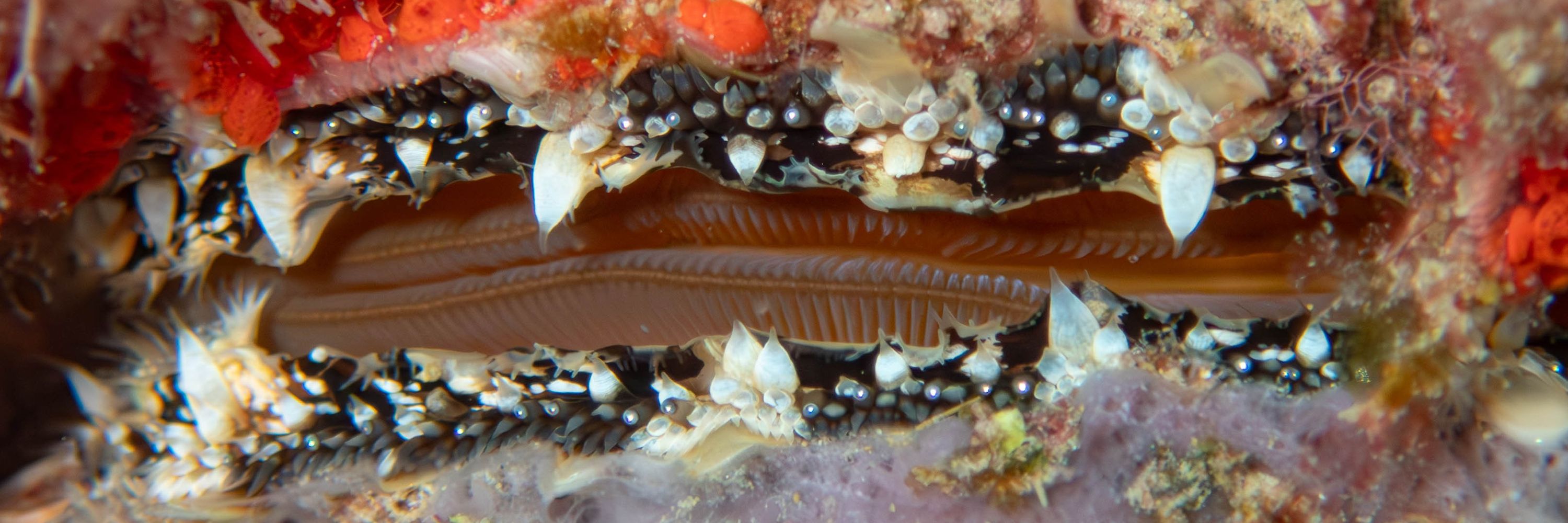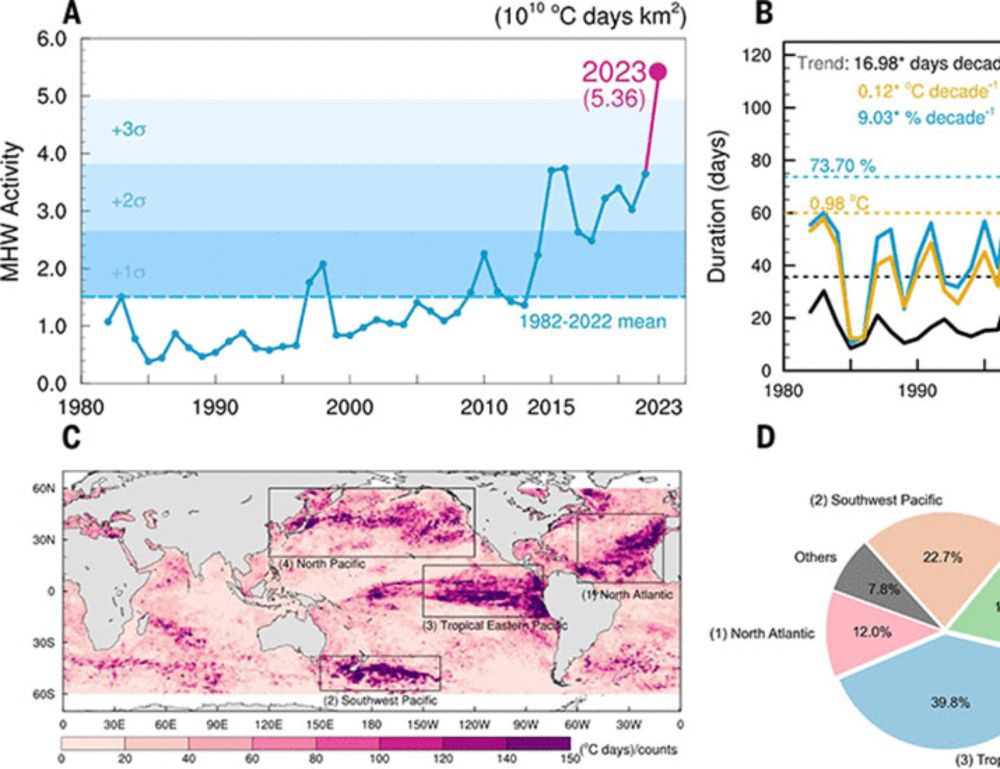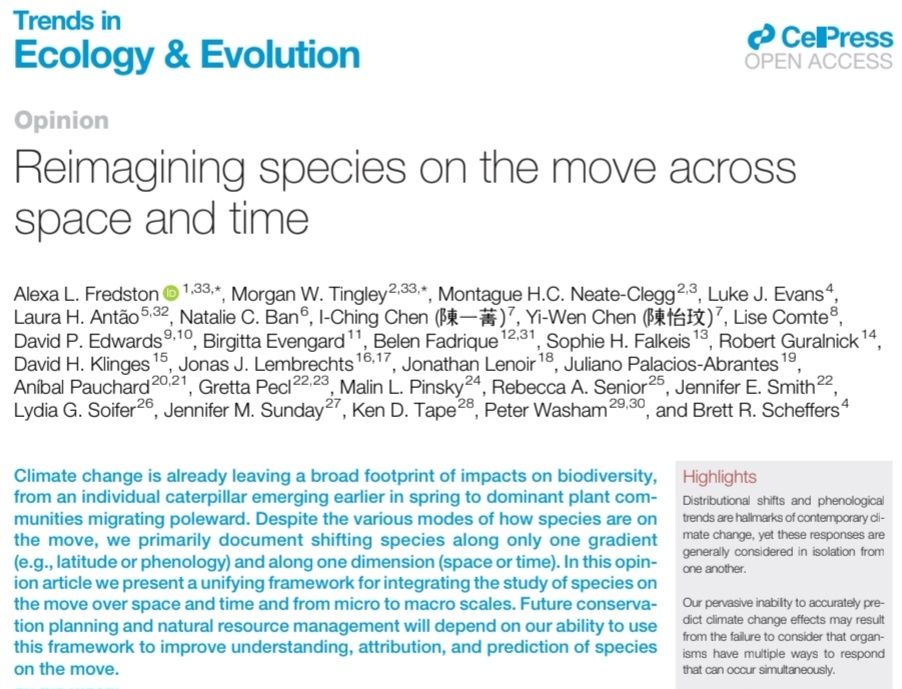
Shahar Chaikin
@shaharchaikin.bsky.social
PhD | Marine Ecologist | Postdoctoral Fellow @mncn-bgcg.bsky.social | Effects of Climate Change on Biodiversity | he/ him | Dad
Check this out! I took one of my old research studies and turned it into an engaging, public-friendly animation.
Science for everyone! 🧠
#spacefortime
#depthredistributions
#warmingimpacts
#fish
youtu.be/I5C22DhwRDM?...
Science for everyone! 🧠
#spacefortime
#depthredistributions
#warmingimpacts
#fish
youtu.be/I5C22DhwRDM?...

The Great Underwater Redistributions
YouTube video by shahar chaikin
youtu.be
November 6, 2025 at 8:26 PM
Check this out! I took one of my old research studies and turned it into an engaging, public-friendly animation.
Science for everyone! 🧠
#spacefortime
#depthredistributions
#warmingimpacts
#fish
youtu.be/I5C22DhwRDM?...
Science for everyone! 🧠
#spacefortime
#depthredistributions
#warmingimpacts
#fish
youtu.be/I5C22DhwRDM?...
I've been debating for a long time whether or not to share this publicly. I'm doing it now because I believe that only by sharing the raw, personal trauma may some understand that this isn't politics—it's about the basic right to life and dignity.
#TwoYearsLater
#CollectiveTrauma
#October7th
#TwoYearsLater
#CollectiveTrauma
#October7th
October 6, 2025 at 10:18 PM
I've been debating for a long time whether or not to share this publicly. I'm doing it now because I believe that only by sharing the raw, personal trauma may some understand that this isn't politics—it's about the basic right to life and dignity.
#TwoYearsLater
#CollectiveTrauma
#October7th
#TwoYearsLater
#CollectiveTrauma
#October7th
Happy to have attended the @mncn-bgcg.bsky.social department gathering in El Ventorrillo! ☀️
It was inspiring to hear about the high-quality research others are doing, sparking ideas for future collaborations. I was also happy to get the chance to present my own research interests and recent work.
It was inspiring to hear about the high-quality research others are doing, sparking ideas for future collaborations. I was also happy to get the chance to present my own research interests and recent work.

October 3, 2025 at 1:46 PM
Happy to have attended the @mncn-bgcg.bsky.social department gathering in El Ventorrillo! ☀️
It was inspiring to hear about the high-quality research others are doing, sparking ideas for future collaborations. I was also happy to get the chance to present my own research interests and recent work.
It was inspiring to hear about the high-quality research others are doing, sparking ideas for future collaborations. I was also happy to get the chance to present my own research interests and recent work.

August 14, 2025 at 9:10 PM
New data on 2023's marine heatwaves is alarming. Oceans hit unprecedented temps & durations, with some events so extreme they're considered once-in-centuries occurrences. It's a clear signal that warming climate impacts are accelerating.
www.science.org/doi/10.1126/...
#unprecedented #oceanwarming
www.science.org/doi/10.1126/...
#unprecedented #oceanwarming

Record-breaking 2023 marine heatwaves
The year 2023 witnessed an extraordinary surge in marine heatwaves (MHWs) across Earth’s oceans, setting new records in duration, extent, and intensity, with MHW activity totaling 53.6 billion °C days...
www.science.org
July 29, 2025 at 10:34 PM
New data on 2023's marine heatwaves is alarming. Oceans hit unprecedented temps & durations, with some events so extreme they're considered once-in-centuries occurrences. It's a clear signal that warming climate impacts are accelerating.
www.science.org/doi/10.1126/...
#unprecedented #oceanwarming
www.science.org/doi/10.1126/...
#unprecedented #oceanwarming
Reposted by Shahar Chaikin
9 de cada 10 muertes en Madrid por la reciente ola de calor se atribuyen al cambio climático
climatica.coop/muertes-madr...
climatica.coop/muertes-madr...

9 de cada 10 muertes en Madrid por la reciente ola de calor se atribuyen al cambio climático - Climática, el medio especializado en clima y biodiversidad
El cambio climático estuvo detrás de casi 400 muertes en Madrid y Barcelona ocurridas durante la primera ola de calor del verano, según un estudio de atribución rápido.
climatica.coop
July 10, 2025 at 7:36 AM
9 de cada 10 muertes en Madrid por la reciente ola de calor se atribuyen al cambio climático
climatica.coop/muertes-madr...
climatica.coop/muertes-madr...
Looking forward to reading this one in detail!
#marineheatwaves #biodiversity
www.nature.com/articles/s44...
#marineheatwaves #biodiversity
www.nature.com/articles/s44...

Marine heatwaves as hot spots of climate change and impacts on biodiversity and ecosystem services - Nature Reviews Biodiversity
Marine heatwaves (MHWs) have become more intense and widespread globally, affecting species, ecosystems and people. After summarizing how and why MHWs are changing, this Review explores these impacts ...
www.nature.com
July 9, 2025 at 11:20 AM
Looking forward to reading this one in detail!
#marineheatwaves #biodiversity
www.nature.com/articles/s44...
#marineheatwaves #biodiversity
www.nature.com/articles/s44...
PhD opportunity for enthusiastic ecologists curious about modeling species abundance @miguelbaraujo.bsky.social Lab.
#PhD #abundance #biogeography
www.maraujolab.eu/2025/07/04/p...
#PhD #abundance #biogeography
www.maraujolab.eu/2025/07/04/p...

PhD candidate in species abundances modelling -
Project Description Understanding species abundance patterns is essential to addressing fundamental questions in macroecology and biogeography, specifically about […]
www.maraujolab.eu
July 4, 2025 at 9:28 PM
PhD opportunity for enthusiastic ecologists curious about modeling species abundance @miguelbaraujo.bsky.social Lab.
#PhD #abundance #biogeography
www.maraujolab.eu/2025/07/04/p...
#PhD #abundance #biogeography
www.maraujolab.eu/2025/07/04/p...
Looking for a nice underwater picture of European sprat (Sprattus sprattus) to be used in a publication with full credit
🙏
#fish #underwater #fishphoto #sprat #EuropeanSprat #SprattusSprattus #Ichthyology
🙏
#fish #underwater #fishphoto #sprat #EuropeanSprat #SprattusSprattus #Ichthyology
June 24, 2025 at 9:32 PM
Looking for a nice underwater picture of European sprat (Sprattus sprattus) to be used in a publication with full credit
🙏
#fish #underwater #fishphoto #sprat #EuropeanSprat #SprattusSprattus #Ichthyology
🙏
#fish #underwater #fishphoto #sprat #EuropeanSprat #SprattusSprattus #Ichthyology
Join us! Postdoc opportunity for marine ecologists that closely match the requirements.
@miguelbaraujo.bsky.social
www.maraujolab.eu/2025/06/18/p...
@miguelbaraujo.bsky.social
www.maraujolab.eu/2025/06/18/p...

Postdoctoral Researcher in Spatial Planning for Marine Protected Areas -
Postdoctoral Researcher in Spatial Planning for Marine Protected Areas Candidate Profile:
Educational and Research Expertise: Candidates should possess a PhD in ecology, marine biology, oceanography,...
www.maraujolab.eu
June 18, 2025 at 10:48 AM
Join us! Postdoc opportunity for marine ecologists that closely match the requirements.
@miguelbaraujo.bsky.social
www.maraujolab.eu/2025/06/18/p...
@miguelbaraujo.bsky.social
www.maraujolab.eu/2025/06/18/p...
Presented my research this week on the long-term and short-term impacts of #climatechange on #fish biomass! A huge thanks to @sibecol.bsky.social for the platform and for fostering connections with inspiring researchers across the Iberian Peninsula and beyond. #Ecology @mncn-bgcg.bsky.social

June 7, 2025 at 4:03 PM
Presented my research this week on the long-term and short-term impacts of #climatechange on #fish biomass! A huge thanks to @sibecol.bsky.social for the platform and for fostering connections with inspiring researchers across the Iberian Peninsula and beyond. #Ecology @mncn-bgcg.bsky.social
Reposted by Shahar Chaikin
Our viewpoint made the cover of BioScience! Beautiful picture from Jean Marie Twambaze academic.oup.com/bioscience/a...

June 3, 2025 at 5:10 PM
Our viewpoint made the cover of BioScience! Beautiful picture from Jean Marie Twambaze academic.oup.com/bioscience/a...
Reposted by Shahar Chaikin

May 27, 2025 at 4:59 PM
Had a relaxing and insightful week at @miguelbaraujo.bsky.social lab retreat! 🌿 We presented our studies and gave each other feedback, which was super helpful. Plus, we got to enjoy some beautiful time in nature. Feeling refreshed and full of new ideas!
@mncn-bgcg.bsky.social
@mncn-bgcg.bsky.social

May 26, 2025 at 11:06 AM
Had a relaxing and insightful week at @miguelbaraujo.bsky.social lab retreat! 🌿 We presented our studies and gave each other feedback, which was super helpful. Plus, we got to enjoy some beautiful time in nature. Feeling refreshed and full of new ideas!
@mncn-bgcg.bsky.social
@mncn-bgcg.bsky.social
Super interesting papers are about to come out now --> BioTIME 2.0 is published- Huge database on temporal biodiversity change
Amazing work by Dornelas, her team, and authors willing to share their fieldwork data
#biodiversity #macroecology #BioTIME
onlinelibrary.wiley.com/doi/10.1111/...
Amazing work by Dornelas, her team, and authors willing to share their fieldwork data
#biodiversity #macroecology #BioTIME
onlinelibrary.wiley.com/doi/10.1111/...

BioTIME 2.0: Expanding and Improving a Database of Biodiversity Time Series
Motivation Here, we make available a second version of the BioTIME database, which compiles records of abundance estimates for species in sample events of ecological assemblages through time. The up...
onlinelibrary.wiley.com
May 15, 2025 at 1:29 PM
Super interesting papers are about to come out now --> BioTIME 2.0 is published- Huge database on temporal biodiversity change
Amazing work by Dornelas, her team, and authors willing to share their fieldwork data
#biodiversity #macroecology #BioTIME
onlinelibrary.wiley.com/doi/10.1111/...
Amazing work by Dornelas, her team, and authors willing to share their fieldwork data
#biodiversity #macroecology #BioTIME
onlinelibrary.wiley.com/doi/10.1111/...
Reposted by Shahar Chaikin
In response to climate change #CC, #species #shift in many dimensions, moving in space along many climatic clines, including #microclimatic ones (horizontally & vertically) & adjusting their #phenology & #behaviour in time
🧪🌐🌍🍁🌳🌲🌴🦔🦅🦎🐝🦐🦑🐠🦈🐋
@cp-trendsecolevo.bsky.social
shorturl.at/W9fGd
🧪🌐🌍🍁🌳🌲🌴🦔🦅🦎🐝🦐🦑🐠🦈🐋
@cp-trendsecolevo.bsky.social
shorturl.at/W9fGd


May 9, 2025 at 4:43 PM
In response to climate change #CC, #species #shift in many dimensions, moving in space along many climatic clines, including #microclimatic ones (horizontally & vertically) & adjusting their #phenology & #behaviour in time
🧪🌐🌍🍁🌳🌲🌴🦔🦅🦎🐝🦐🦑🐠🦈🐋
@cp-trendsecolevo.bsky.social
shorturl.at/W9fGd
🧪🌐🌍🍁🌳🌲🌴🦔🦅🦎🐝🦐🦑🐠🦈🐋
@cp-trendsecolevo.bsky.social
shorturl.at/W9fGd
Reposted by Shahar Chaikin
Claims by the Trump administration that marine protected areas are a heavy-handed restriction on the U.S. fishing industry do not hold water.
Science shows these refuges for sea life help local economies and allow fish populations to thrive
By @whysharksmatter.bsky.social
Science shows these refuges for sea life help local economies and allow fish populations to thrive
By @whysharksmatter.bsky.social

Trump is stripping protections from marine protected areas – why that’s a problem for fishing’s future, and for whales, corals and other ocean life
America’s marine protected areas help fish populations thrive. Trump’s plan to open them to industrial fishing may ultimately harm the fishing industry itself.
buff.ly
May 4, 2025 at 11:48 AM
Claims by the Trump administration that marine protected areas are a heavy-handed restriction on the U.S. fishing industry do not hold water.
Science shows these refuges for sea life help local economies and allow fish populations to thrive
By @whysharksmatter.bsky.social
Science shows these refuges for sea life help local economies and allow fish populations to thrive
By @whysharksmatter.bsky.social
Reposted by Shahar Chaikin
US President Donald Trump’s proposed budget for fiscal year 2026 calls for unprecedented cuts to scientific agencies that, if enacted, would deal a devastating blow to US science, policy specialists say.
https://go.nature.com/4jYv3IP
https://go.nature.com/4jYv3IP

Trump proposes unprecedented budget cuts to US science
Huge reductions, if enacted, could have ‘catastrophic’ effects on US competitiveness and the scientific pipeline, critics say.
go.nature.com
May 2, 2025 at 10:25 PM
US President Donald Trump’s proposed budget for fiscal year 2026 calls for unprecedented cuts to scientific agencies that, if enacted, would deal a devastating blow to US science, policy specialists say.
https://go.nature.com/4jYv3IP
https://go.nature.com/4jYv3IP
Looking forward to reading this one: "North American bird declines are greatest where species are most abundant"
www.science.org/doi/10.1126/...
@science.org
www.science.org/doi/10.1126/...
@science.org

North American bird declines are greatest where species are most abundant
Efforts to address declines of North American birds have been constrained by limited availability of fine-scale information about population change. By using participatory science data from eBird, we ...
www.science.org
May 1, 2025 at 9:19 PM
Looking forward to reading this one: "North American bird declines are greatest where species are most abundant"
www.science.org/doi/10.1126/...
@science.org
www.science.org/doi/10.1126/...
@science.org
Looking forward to the first Range Edge Dynamics working group meeting @idiv-research.bsky.social in early May! 🦋🌍 We will be working on the demographic consequences of range shifts”. #Biodiversity #ClimateChange @bugecology.bsky.social @kemarshall.bsky.social
www.idiv.de/research/sdi...
www.idiv.de/research/sdi...

sRED | iDiv
www.idiv.de
April 30, 2025 at 11:25 AM
Looking forward to the first Range Edge Dynamics working group meeting @idiv-research.bsky.social in early May! 🦋🌍 We will be working on the demographic consequences of range shifts”. #Biodiversity #ClimateChange @bugecology.bsky.social @kemarshall.bsky.social
www.idiv.de/research/sdi...
www.idiv.de/research/sdi...
Reposted by Shahar Chaikin
We show that marine communities around the world exhibit trophic convergence in similar environments — a global pattern echoing what we also found on land. This challenges classic biogeographic models and opens new doors for predicting biodiversity responses to change.
www.pnas.org/doi/10.1073/...
www.pnas.org/doi/10.1073/...
PNAS
Proceedings of the National Academy of Sciences (PNAS), a peer reviewed journal of the National Academy of Sciences (NAS) - an authoritative source of high-impact, original research that broadly spans...
www.pnas.org
April 25, 2025 at 6:09 PM
We show that marine communities around the world exhibit trophic convergence in similar environments — a global pattern echoing what we also found on land. This challenges classic biogeographic models and opens new doors for predicting biodiversity responses to change.
www.pnas.org/doi/10.1073/...
www.pnas.org/doi/10.1073/...
Reposted by Shahar Chaikin
I’m recruiting a PhD student in macrogenetics at Dalhousie University 🇨🇦! Focus will be on the biogeography of vertebrate genetic diversity or urban evolutionary ecology.
Full ad: www.schmidt-biodiversity-lab.org/macrogenetic...
If the ad is up, applications are still open.
Please share widely! 🧬🧬
Full ad: www.schmidt-biodiversity-lab.org/macrogenetic...
If the ad is up, applications are still open.
Please share widely! 🧬🧬
Macrogenetics PhD position | schmidt-biodiversity-lab
www.schmidt-biodiversity-lab.org
April 21, 2025 at 5:41 PM
I’m recruiting a PhD student in macrogenetics at Dalhousie University 🇨🇦! Focus will be on the biogeography of vertebrate genetic diversity or urban evolutionary ecology.
Full ad: www.schmidt-biodiversity-lab.org/macrogenetic...
If the ad is up, applications are still open.
Please share widely! 🧬🧬
Full ad: www.schmidt-biodiversity-lab.org/macrogenetic...
If the ad is up, applications are still open.
Please share widely! 🧬🧬
Interesting read on a core question in species redistribution research: abundance vs. occurrence data. Turns out, the choice really matters – authors show that they lead to different estimates. 🤔 onlinelibrary.wiley.com/doi/10.1111/...
#ecology #biogeography #speciesdistribution
#ecology #biogeography #speciesdistribution

How would estimation of geographic range shifts of marine fishes be different when using occurrence and abundance data?
Aim Geographic range shifts are a common species' response to climate change. While occurrence data are commonly used to estimate species' geographical range shifts, ongoing debate suggests that loc...
onlinelibrary.wiley.com
April 23, 2025 at 3:48 PM
Interesting read on a core question in species redistribution research: abundance vs. occurrence data. Turns out, the choice really matters – authors show that they lead to different estimates. 🤔 onlinelibrary.wiley.com/doi/10.1111/...
#ecology #biogeography #speciesdistribution
#ecology #biogeography #speciesdistribution
Five years ago, my first paper on the coastal breeding aggregations of threatened stingrays and guitarfish in the Levant was published! 🧵
onlinelibrary.wiley.com/doi/epdf/10....
#MarineBiology #Conservation #Mediterranean #Batoids #AquaticConservation
onlinelibrary.wiley.com/doi/epdf/10....
#MarineBiology #Conservation #Mediterranean #Batoids #AquaticConservation

April 23, 2025 at 6:06 AM
Five years ago, my first paper on the coastal breeding aggregations of threatened stingrays and guitarfish in the Levant was published! 🧵
onlinelibrary.wiley.com/doi/epdf/10....
#MarineBiology #Conservation #Mediterranean #Batoids #AquaticConservation
onlinelibrary.wiley.com/doi/epdf/10....
#MarineBiology #Conservation #Mediterranean #Batoids #AquaticConservation


